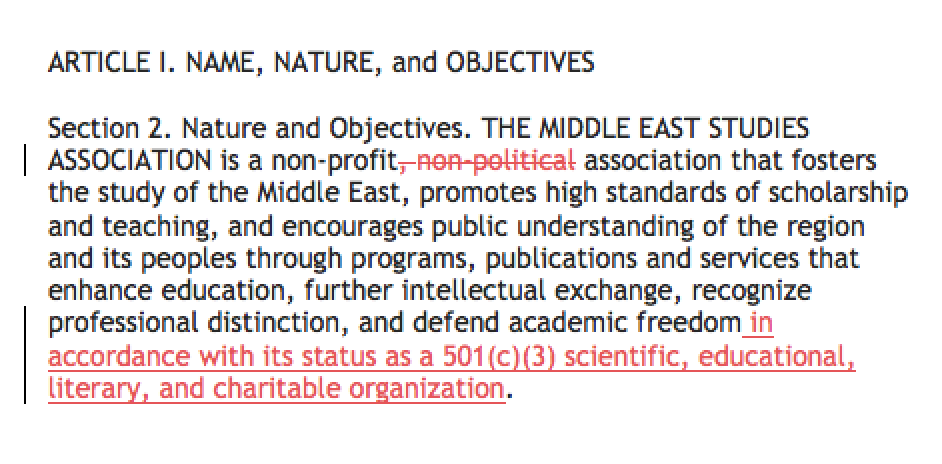[The following letter was issued by a group of former presidents of the Middle East Studies Association (MESA) on 7 November 2016 in support of a bylaw amendment introduced at the 2016 Members Meeting. The amendment is currently up for a membership-wide vote. See below for details on voting.]
Enhancing MESA’s Legal Standing
Dear members of the Middle East Studies Association of North America,
We are writing as former MESA presidents, in light of recent regional trends in the Middle East and political developments in the United States. Scholars, as well as academic organizations, working on the region are confronting renewed pressures in such countries as Turkey, Iran, Israel, Egypt, Syria and several Arab Gulf states. Many of our members have been engaged in advocacy around these issues, and our Committee on Academic Freedom (CAF) has long documented, and acted upon, numerous individual and collective cases. Additionally, substantial sections of the membership are involved in broader debates and conversations taking place in numerous US academic associations and institutions, ranging from discussions around BDS to responses to the arrest and intimidation of Turkish, Kurdish, Egyptian, Iranian, Bahraini, and other academics.
As MESA and its members continue to debate and act upon these issues, the potential for frivolous legal action on the part of Middle Eastern states, as well as advocacy groups and local governments in the United States, grows. Whereas all of MESA’s activities are in compliance with its non-profit status, several legal opinions have highlighted the weakness of Article 1, Section 2 of our bylaws, which currently defines the organization as ‘non-political’. This definition is not included in most bylaws of comparable academic societies in the US. Rather than protecting our status, it leaves us more vulnerable than the rest of our peer organizations.
As former presidents of MESA, who have worked on developing and protecting the organization over the course of several decades, we would encourage the amendment of Article 1, Section 2 of our bylaws, while still retaining our explicit commitment to acting in accordance with our non-profit status.
Sincerely,
[Full Name, Presidential Term]
Michael C. Hudson, 1987
John Esposito, 1989
Yvonne Haddad, 1990
Barbara Aswad, 1992
John Voll, 1993
Rashid Khalidi, 1994
Joel Beinin, 2002
Lisa Anderson, 2003
Juan Cole, 2006
Mervat Hatem, 2008
Suad Joseph, 2011
Peter Sluglett, 2013
Track-Changes Display of Proposed Bylaw Amendment

How to Vote [Vote "Yes"]
The general membership will now vote on the amendment during period between 1 February 2017 and through 15 March 2017. Only current MESA members (meaning individuals with a 2017 membership can vote in the election.]
- To read the proposed amendment, click here. [Vote "Yes"]
- If you are a current MESA member and would like to vote in this election, click here. [Vote "Yes"]
- If you are a past member and would like to renew your member, log into MyMESA and renew your membership for 2017, and then proceed to the link for the ballot. [Vote "Yes"]